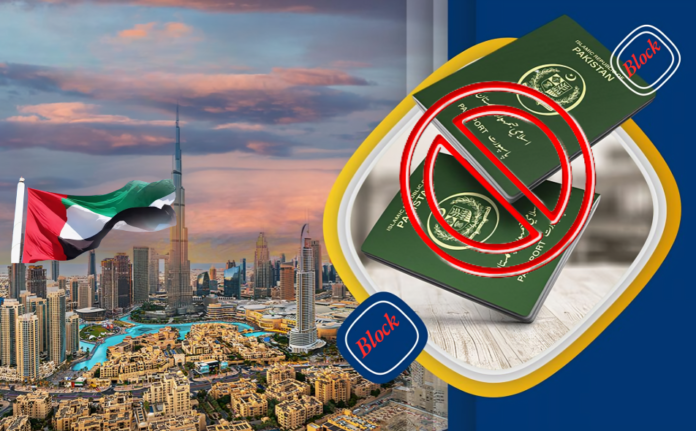The Pakistan Passport Block UAE decision has raised significant concern among Pakistanis residing in the UAE and abroad. The Pakistani government has implemented strict measures targeting nationals involved in criminal activities, particularly those incarcerated in the UAE. This move has had a profound impact on the lives of thousands of Pakistanis. Below is an in-depth analysis of the policy, its rationale, implications, and future outlook.
Why Pakistan Passport Block UAE Was Implemented
The Pakistan Passport Block UAE was a direct response to rising criminal activities involving Pakistani nationals in the UAE. The Ministry of Interior has taken decisive action based on detailed reports from UAE authorities regarding the involvement of Pakistani citizens in various crimes. The key points behind the decision include:
1. 4,700 Pakistanis jailed in the UAE had their passports deactivated by the government.
2. A total of 5,292 Pakistani nationals have been convicted for different crimes, including drug trafficking, fraud, and theft.
3. This policy aims to curb criminal behavior and ensure that Pakistani citizens comply with international laws while working or living abroad.
Breakdown of Offenses Leading to Passport Revocation
Here is a detailed breakdown of the types of criminal activities committed by Pakistani nationals, which led to the Pakistan Passport Block UAE:
Drug-Related Offenses: 2,470 individuals were convicted for drug-related crimes, contributing significantly to the passport block.
Fraud, Deception, and Sexual Harassment: 100 individuals are involved in fraudulent activities and sexual harassment cases, leading to the revocation of their passports.
Theft, Murder, and Robbery: 704 individuals were convicted for theft. 216 individuals were imprisoned for murder and robbery, leading to their passports being invalidated.
Unlawful Residency: 375 Pakistani nationals residing unlawfully in the UAE also had their passports revoked as part of the crackdown.
Govt’s Stance on the Pakistan Passport Block UAE
From the government’s perspective, the Pakistan Passport Block UAE is part of a broader initiative to tackle crime and improve Pakistan’s image internationally. By blocking the passports of individuals involved in criminal activities abroad, Pakistan aims to discourage illegal behavior and show its commitment to working closely with foreign governments to address such issues.
Furthermore, the measure aligns with Pakistan’s broader goals of ensuring that its citizens uphold the rule of law, both domestically and internationally.
The policy also serves as a reminder to Pakistani nationals abroad to remain law-abiding, as the Pakistani government is now taking decisive steps to hold them accountable for their actions. As authorities continue to monitor the situation, it is expected that further actions may be taken to address the root causes of criminal behavior among Pakistanis abroad.
Social and Economic Impact of the Pakistan Passport Block UAE
The decision to implement the Pakistan Passport Block UAE has not only affected the criminal offenders but also created far-reaching social and economic challenges for many Pakistanis. Here are the key impacts:
1. Personal and Family Hardships:
- The revocation of passports has left many families in distress as they face difficulties in traveling, conducting business, or even maintaining communication with relatives in Pakistan.
- Legal challenges have emerged, especially for those who were unaware of their criminal ties and are now facing consequences for their relatives’ actions.
2. Economic Impact on Migrants:
- The Pakistan Passport Block UAE policy may negatively impact Pakistani expatriates working in the UAE. Many of them rely on their passports for remittance transfers, employment verification, and business purposes.
- The policy may reduce the number of Pakistanis willing to migrate to the UAE, potentially affecting Pakistan’s foreign exchange earnings from remittances.
3. Disruptions to Migrant Workforce:
- Those affected by the passport block may find it difficult to return home or move to other countries for work, disrupting their careers and financial stability. Future Outlook and Recommendations
Future Outlook and Recommendations
The Pakistan Passport Block UAE policy has highlighted the urgent need for a more comprehensive approach to managing Pakistani nationals living abroad. While addressing criminal activities is necessary, there must also be efforts to provide better support for law-abiding Pakistani citizens working or residing overseas.
Ensuring that those who have been wrongfully affected by this decision can regain their travel rights is crucial to maintaining the goodwill of Pakistan’s expatriate community.
Also Read: Dubai Visa Rejection: Expert Tips to Secure Approval
Additionally, it is essential for the Pakistani government to enhance diplomatic relations with host countries like the UAE to avoid the mass impact of such decisions on its citizens. Building better legal frameworks to handle issues related to crime and immigration will help in creating a fairer and more efficient process for managing passport and legal matters.
A Call for Balanced Action
The Pakistan Passport Block UAE decision is a significant development with far-reaching implications for thousands of Pakistanis in the UAE. While it is crucial to address the criminal activities that have triggered this policy, the government must also consider the broader social, legal, and economic impacts on those who are affected.
Moving forward, a more balanced approach that safeguards the rights of law-abiding citizens while ensuring justice for those involved in criminal activities is essential.


